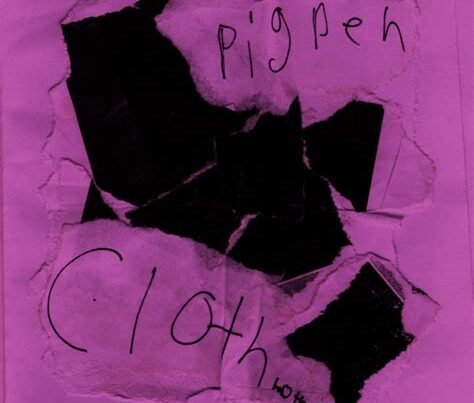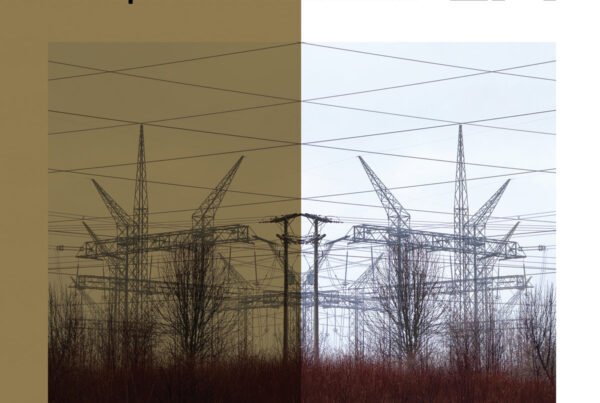Experimental metallers The Body team up with experimental electronic artist Dis Fig in an experimentally harsh yet beautiful release.
Release date: February 23, 2024 | Thrill Jockey | Bandcamp | Spotify | YouTube
The Body‘s… ahem… body of work is staggering, with their quarter-century spanning career seeing an impressive amount of studio albums, EPs, splits, and most relevantly here, collaborative albums. Featuring the likes of Thou, Full of Hell, BIG|BRAVE, and Whitehorse to name a few, the experimental duo are not afraid to put their heads together with their peers to craft something that strays from their already diverse sound. While I’m more familiar with their own releases, like the deep and doomy I Shall Die Here, or the harrowing No One Deserves Happiness, I’ve had their collaborations on my ‘to-listen’ queue for a while now. Looks like I know what I’ll be spinning after this review then…
Though this was my introduction to the work of Felicia Chen, who goes by the artist pseudonym Dis Fig, a quick dive into her 2019 solo effort PURGE reveals both an explorative nature, a willingness to bend genres to her whim, a taste for the darker side of music, as well as a deft hand in crafting music that takes time and patience to see the beauty and the artistry hidden beneath the ‘harsh’ exterior. Chen too has collaborated with artists throughout her career, on top of playing warped DJ sets and taking part in performance-art pieces, and while a joint effort with The Body may not have been inevitable or even imaginable, it was bound to produce interesting results – on paper if not on tape.
While Chen’s vocals in the opening minutes of “Eternal Hours” are hushed and almost dreamlike, it’s not long before Chip King’s signature high-pitched howls join the fray, underscoring the tone of yearning the track has with a sense of pain. For listeners more familiar with The Body (such as myself), you may initially miss the droning, discordant guitars of their solo work, but it won’t be long before the electronic cacophony both artists have created begins to tickle your heavy music pleasure-centers.
“To Walk A Higher Path” begins with some pulsing electronic notes and a chant, before Chen’s vocals begin – still hypnotic, yet growing more aggressive here. The track beats like a cybernetic heart, one driven to pump by the electronic maelstrom urging it on, glitching, screaming, but ever steady thumping on and on.
Roiling distortion wakes “Dissent, Shame” to life, the music of the track rumbling and thundering towards us as the vocals assure us there is nothing we can do about the oncoming storm. Around the halfway mark the pace quickens before the vocals become more strained, more sorrowful, building to a crescendo that utilizes layered choir-like vocals for a haunting finish.
King’s vocals take the lead on the title track (at least in the beginning), and there’s something about hearing the breaths he takes between howls that lends “Orchards of a Futile Heaven” a very emotionally raw feeling, deepened by the primal drumming, and complemented by Chen’s soaring tone on this song.
“Holy Lance” is one of the quieter tracks (at least for the first half), however as the tension of the music surges, so do the vocals, the song serving as a showcase of the talent Chen wields in her lungs, some absolutely chilling, hair-standing-on-end vocals close this track out. For real, go listen, now.
At over 9 minutes, “Coils of Kaa” is the longest song on the album, and uses the first couple of minutes of that time to ramp up the anticipation. The song as a whole gives us a glimpse into the more harsher vocals Chen is capable of, and I have a sneaking suspicion that her screams around the 2 minute mark are mixed with King’s; if so, it is a beautifully coarse symbiosis that gave me goosebumps. This is also the track with the least-discernibly distorted guitar, the drones of which blend with the electronic pounding that makes the song feel much shorter than its runtime, all of this coming to a crashing climax just before the 8 minute mark. An absolute juggernaut of a track!
And album closer “Back to the Water” feels fittingly sombre from the start, that sense of sadness carrying on throughout as the music and the vocal performances build in intensity to a blistering finish. I feel that, as by this point, I did not want this album to end either.
The guitars are incredibly distorted, and at times it’s hard to tell if the drums are heavily modulated or just straight-up synthesized, but the smearing of the boundaries of both The Body and Dis Fig‘s separate sounds (as much as you can consider either artist having a set distinct ‘sound’), along with the textures added in around that core that makes Orchards of a Futile Heaven a layered work of art, and perfect for repeat listens. All of this is not to say nothing of the respective vocal performances featured on the record, totally complementary and varied, and an emotional odyssey to boot. This album will exhaust you, in the best way possible.
Similarly to Full of Hell and Nothing‘s recent collaboration When No Birds Sang, the artists involved in this record have managed to craft a collection of songs that bears hallmarks of both, yet sounds distinctly like neither. What we have is a sound that is electronic but raw, harsh yet beautiful, chaotic yet serene. I feel fans of The Body could take this as a gateway album to the work of Dis Fig, and for fans of Dis Fig to get into more guitar-driven experimentalism (I already loved The Body, but after hearing her performance on this album, I may just become a Dis Fig fanboy too). Either way, for those willing to be patient, to trust the artists to take them on the journey, Orchards of a Futile Heaven is an extremely rewarding listen both on paper, on tape, and between the ears.






